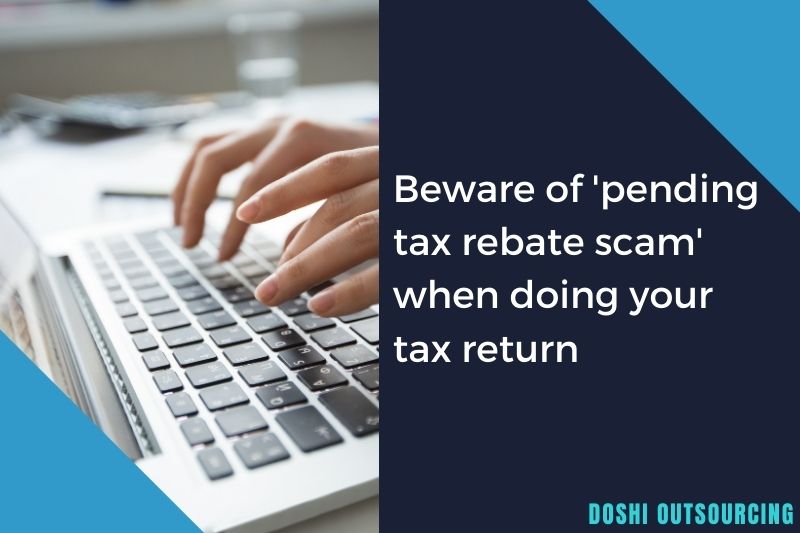Save Yourself from Scam of Pending Tax Rebate

December 07, 2020
In any situation, people try to find some advantage and use it in their favour. The same applies to frauds. Some people are trying to use Covid-19 to lure people into a trap. While the government plans different schemes to help people, it is necessary to determine the authenticity of any email, message, or call. HMRC did extend help to relieve the pressure of tax while they were struggling with their businesses. However, some frauds use a likely situation and create fake convincing emails. The idea of getting a rebate might be so tempting that people aware of the possibilities of such scams also may get trapped in it.
What should you do?
A new scam is detected targeting the public, which says ‘due to the current COVID-19 pandemic you have a pending tax rebate’. While such fake emails are not received for the first time, the COVID-19 situation might make some people think it may be real. If you receive a text like above, DO NOT click on the link to calculate your claim. It may be a SCAM, and you may put yourself in a problem.
If you receive any suspicious message, you must report it immediately as below:
https://www.gov.uk/government/organisations/hm-revenue-customs/contact/reporting-fraudulent-emails
If you have received a suspicious call, click on below to get the online form to report the same. Your email id will be asked.
Report a suspicious HMRC phone call
If you have received a suspicious email, mention a subject like ‘Suspicious email address’ and email the details to phishing@hmrc.gov.uk
In case you received an SMS, then you can forward it to 60599. Your regular charges (depending on the network you use) will apply.
Remember, you will never receive any notifications of a tax rebate from HMRC, nor will they ever ask you to disclose your personal or payment information by email. So, if you receive any such email, report it immediately to HMRC.
The following email addresses reported to have been used to distribute the tax rebate emails, according to HMRC:
- reve.alert@hmrc.gov.uk
- services@hmrc.co.uk
- noreply@hmrevenue.com
- service@hmrc.gov.uk
- service.refund@hmrc.gov
- secure@hmrc.co.uk
- hmrc@gov.uk
- taxes@hmrc.co.uk
- taxrefund-notice@hmrc.gov.uk
- taxrefund@hmrc.gov.uk
- refund-help@hmrc.gov.uk
- service@online.com
- email@hmrc.gov.uk
- refund.alert@hmrc.gov.uk
- refunds@hmrc.gov.uk
- srvcs@hmrc.gov.uk
- alertsonline@hmrc.co.uk
- info@hmrc.gov.uk
- rebate@hmrc.gov.uk
The fake ids or websites can look genuine, so be cautious.
Bottom line:
You will never get an email or text from HMRC for any refund due. HMRC sends such a letter by post. No text message is sent offering a tax refund in exchange for personal or banking information. Also, no phone call is ever made for such a purpose. All you can expect is a letter from HMRC in the post. The letter should be from HMRC. HMRC never hires external companies for such work.
If you do not know whether something is fishy and needs to be reported, talk to your accountant, do not ignore it, as your pro-activeness can reduce problems and help us detect frauds. Do not just delete the suspicious email. Forward all suspicious emails for the investigation to HMRC at phishing@hmrc.gsi.gov.uk
While all sorts of phishing emails are common, you can save yourself by being careful. Never open attachments or click on links contained in suspicious emails.
If you have an accountant, you can also ask them, and they will confirm Genuity. Your accountant will have an idea of what is currently being offered by HMRC and if you are eligible for any rebate.
We at Doshi Outsourcing ensure our clients get the best services. We suggest our clients to forward any such email to us so that we can guide them and save them from any possible trouble. If you do not have an accountant, contact us to find out our fixed fees for various services under one roof.
If you feel there is made a pressure to act quickly or personal details are being asked, STOP TO THINK. Contact your accountant immediately.


